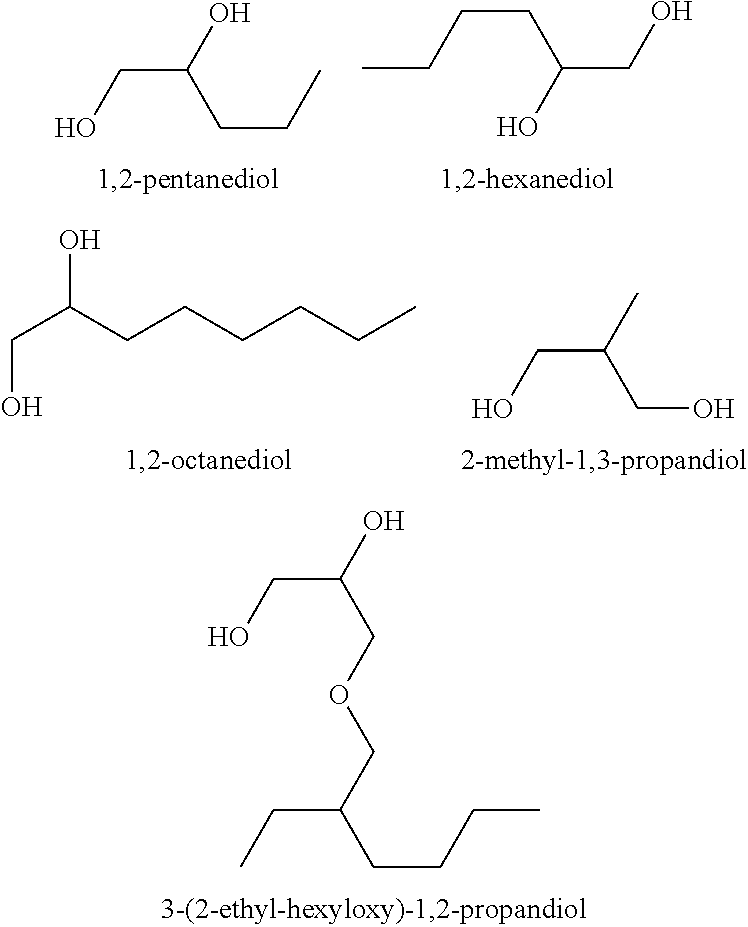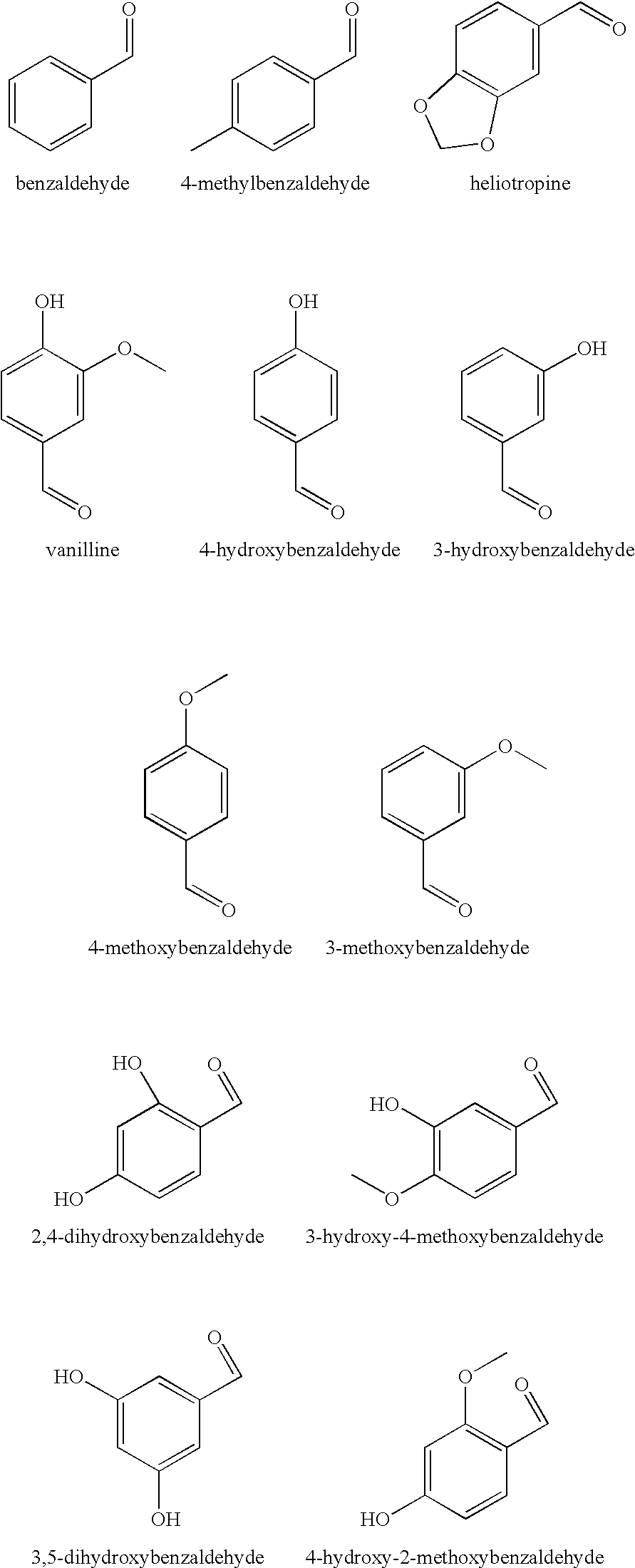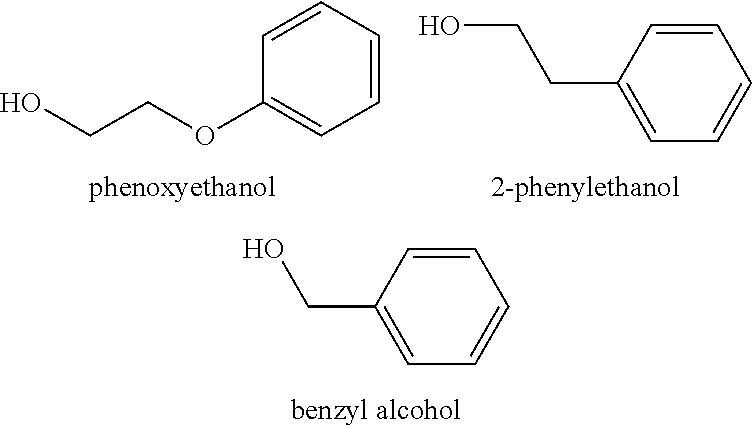Compositions
a technology of compositions and personal care products, applied in the field of compositions, can solve the problems of spores being antimicrobial compounds are not effective against fungal spores, and are significantly more difficult to kill, so as to reduce the number of spores
- Summary
- Abstract
- Description
- Claims
- Application Information
AI Technical Summary
Benefits of technology
Problems solved by technology
Method used
Image
Examples
example 1
Sporicidal Effect of Test Compounds in Water
[0059]Aspergillus niger ATCC 16404 spores are added to water to obtain a density of 3×105 spores / ml.
[0060]In order to prepare the spores, the test strain is grown for 5 days on potato dextrose agar at room temperature. The spores are harvested with a solution containing 0.1% Tween 80, peptone 0.1% and NaCl 0.85% and the spore concentration is adjusted to the density indicated above.
[0061]Test compounds are dissolved in dipropyleneglycol to a concentration of 20%.
[0062]These stock solutions are added to 10 ml aliquots of the spore suspension to obtain a final concentration of the test compounds of 0.1%. The sporicidal effect is shown by a reduction of spore counts after 7 days.
[0063]The reduction factor is determined as follows. Aliquots of the above prepared suspension of microorganisms (here: spore suspension prepared as described above) are plated on a suitable agar medium (see above) and the developing colonies are counted both for samp...
example 2
Activity Against Bacteria, Yeast and Mold Spores in a Cosmetic Cream
[0066]A preservative-free oil-in-water emulsion skin cream is used. Test samples of cream are made up to contain different amounts of diol compounds and / or benzaldehyde derivatives. The diol compound and the benzaldehyde derivatives is added to an aliquot of 10 g of the cream in 50 ml tubes in a concentration as shown in the table below. After addition of the preservative / preservative enhancer, the cream is thoroughly mixed to achieve a homogeneous distribution. The cream is then stored for 1-3 days to equilibrate at room temperature (in order to achieve a homogenous partitioning of compounds between oil and water phase).
[0067]For testing of sporicidal effect, to each sample 100 μl of a spore suspension of Aspergillus niger ATCC 16404 containing 3×107 spores / ml (prepared as described in example 1) is added.
[0068]After regular test intervals, samples of 1 g cream are removed and added to 20 ml of a neutralizer soluti...
example 2b
Activity Against Bacteria, Yeast and Mold Spores in a Cosmetic Cream b)
[0080]The example is performed as described in example 2 except for the following changes:
[0081]The preservative-free cosmetic cream for application to the human skin is Cremor basalis (commercially available from Fagron GmbH, Barsbüttel, Germany). The amounts of diol compounds and benzaldehyde derivatives that are added to an aliquot of 10 g of the cream in 50 ml tubes to give a concentration (w / w) of 0.125-4% are as shown in the table below, as are the results obtained.
TABLE 3Activity of test compositions against A. niger spores in a skin cream withdifferent diols alone or in combination with 4-hydroxybenzaldehyde (4-HBA)ConcentrationConcentrationpreservative4-HBAReduction factorPreservative used[%][%]fungal spores, 7dNo added diol compound (control)00.1255.52-Methyl-1,3-propandiol425.92-Methyl-1,3-propandiol23.32-Methyl-1,3-propandiol20.125>3001,2-Octandiol0.252.21,2-Octandiol0.250.125>3003-(2-ethyl-hexyloxy)-...
PUM
| Property | Measurement | Unit |
|---|---|---|
| Fraction | aaaaa | aaaaa |
| Fraction | aaaaa | aaaaa |
| Fraction | aaaaa | aaaaa |
Abstract
Description
Claims
Application Information
 Login to View More
Login to View More - R&D
- Intellectual Property
- Life Sciences
- Materials
- Tech Scout
- Unparalleled Data Quality
- Higher Quality Content
- 60% Fewer Hallucinations
Browse by: Latest US Patents, China's latest patents, Technical Efficacy Thesaurus, Application Domain, Technology Topic, Popular Technical Reports.
© 2025 PatSnap. All rights reserved.Legal|Privacy policy|Modern Slavery Act Transparency Statement|Sitemap|About US| Contact US: help@patsnap.com



